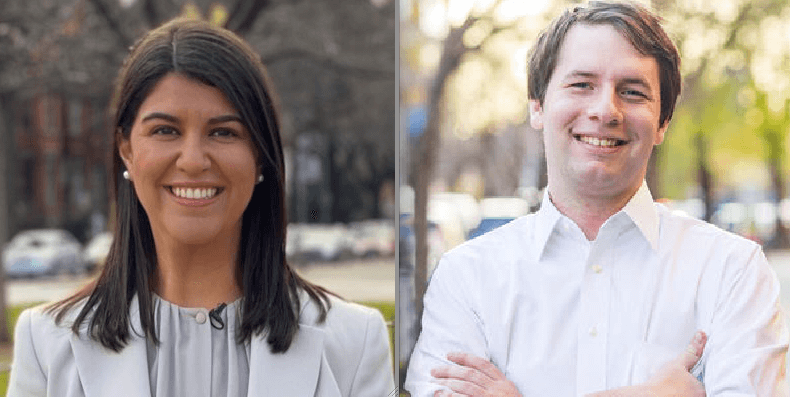Ward 2 Vote: Pinto, Kennedy Too Close to Call; Evans Rejected
By • June 3, 2020 0 1650

The result of the heavily contested Democratic primary for Ward 2’s District Council seat was too close to call by noon, Wednesday, June 3 — and the winner might not be known for a week.
According to the D.C. Board of Elections, Brooke Pinto was leading Patrick Kennedy by only 102 votes: 2,150 to 2,048. Several thousand mail-in and special ballots were still to be counted.
Former Ward 2 Council member Jack Evans, who had held the seat for nearly three decades before relinquishing it in January due to ethics violation accusations, had garnered only 293 votes by noon on June 3. Jordan Grossman was third with 1,562 votes, Kishan Putta fourth with 760 votes and John Fanning fifth with 526.
Due to public health precautions taken to protect voters during the COVID-19 pandemic, voting conditions for this election were unusual in almost every way. Beginning on May 22, the Board of Elections opened only 22 precincts for in-person voting between 8 a.m. to 7 p.m. It mailed more than 92,000 absentee ballots, a number nearly equal to the total number of absentee and in-person voters in 2016. By May 31, the board, which encouraged voters to mail in their ballots by June 2, had received 37,000.
But there were glitches.
Many people did not receive the ballots they had signed up for. By Tuesday afternoon, many — the Washington Post estimated close to one-third — decided to vote in person.
Long lines of waiting voters at Hardy Middle School, Georgetown’s only voting center, wearing face coverings and standing at least six feet apart, wound up the block and around the corner on the afternoon of election day, June 2.
Only 10 voters were allowed in the voting center at a time. Inside, registration and ballot distribution tables, voting booths for electronic and paper ballots and a final ballot completion station were all spaced about 10 feet apart, overseen by poll volunteers with face coverings and, in some cases, gloves. The two parking spots for mobile voting — where poll officials brought iPads for registered voters to vote from their cars — were busy all afternoon.
At the proper distance from the voting center and along the line of waiting voters on the sidewalk, many of the candidates, including Kennedy, Putta and Fanning, wearing face masks and practicing social distancing, introduced themselves to voters and offered to answer questions. Pinto had set up a large table under an umbrella, with bottles of water for voters. Evans sat across the street with supporters and answered questions. He attempted to make the case that his experience with city finances was crucial to help the District navigate the massive revenue losses caused by the coronavirus shutdown.
The Board of Elections estimated that some 13,000 people cast votes in person on June 2.
“If the top vote-getters are within a few hundred of each other by Wednesday morning, that will probably mean several days, if not a week, of delay before the all the mail-in and absentee and provisional special ballots are counted,” Kennedy told The Georgetowner on Tuesday. On Wednesday morning, Kennedy wrote: “The preliminary counts are very promising, showing us within just a hundred votes so far. Likely thousands of the mail-in votes have not yet been counted and are at least a week away.”
Evans failed to persuade voters to give him a second chance. After his low results on Wednesday, Evans told the Washington Post: “I am glad I ran. I’m glad I gave the voters in Ward 2 an opportunity, and I want to thank the voters and residents of Ward 2 for their support over the last 29 years and the opportunity to serve. And now it’s a new chapter in my life, and I don’t know what that is, but I’ll be heading in a different direction. And that’s all there is to it.”
“The election systems struggled to manage more than 90,000 absentee ballot requests, compared to the usual 6,000,” said Board of Elections Chair Michael Bennett, who acknowledged that the election did not go smoothly. “The system gets clogged and the technology doesn’t tend to have to manage that large of a volume.”
At a noontime press conference on June 3, Mayor Muriel Bowser called the long lines at some voting centers “nothing short of failed execution.”

